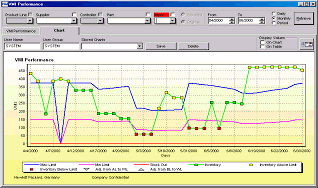The Idea
Web-based vendor managed inventory allows trading partners to increase their service level while reducing costs. Customers communicate their short- and long-term forecasted demand to their suppliers over the Internet, in real time. Suppliers manage inventory and replenishment orders based on agreed coverage ranges. This collaboration results in a win-win situation for both the customer and the supplier.
ICON-VMI - A new Aproach
ICON-VMI is a Web-based solution for a fast connection and an efficient communication between customers and their supplying partners.
Provides a real-time transparent view of current consumption, stock levels and demand
Electronic mapping and integration of suppliers without internal system changes
Internet connection and Web-Browser, no additional software needed - enables collaboration with small suppliers
Automation of procurement and supply processes
Current State
Customers and suppliers communicate over telephone and fax and
 have to process orders in different redundant environments in a time consuming
and error prone process. In order processing, procurement and logistics employees
suffer from high rates of manual and routine tasks. Information about stock levels,
forecast, demand fluctuations, in-transits and foreseen shortages is either not available
or time consuming to get.
have to process orders in different redundant environments in a time consuming
and error prone process. In order processing, procurement and logistics employees
suffer from high rates of manual and routine tasks. Information about stock levels,
forecast, demand fluctuations, in-transits and foreseen shortages is either not available
or time consuming to get.
These deficits along with safety consciousness result in overstated demand from
customers and too high inventory levels at suppliers. Often even additional shifts
have to be executed in order to satisfy the (unrealistic) demand resulting in extra costs.
Solution
The reasons for high stock- and poor service levels are clear: missing visibility
of the real requirements within the supply-chain and the inaccuracy of demand data.
 ICON-VMI provides an accurate demand and inventory view in real time to suppliers.
The coverage range allows automatic adaptation of minimum and maximum inventory levels to
seasonal or promotional demand fluctuations. ICON-VMI uses the same data as the customerís
planning system. This ensures synchronization of numbers and dates between the supplier and
the customer side. The supplier monitors material flow, in-transits and current consignment
stock at the customer side. Therefore he can react immediately on new or changing
demands and define optimal replenishment sizes.
ICON-VMI provides an accurate demand and inventory view in real time to suppliers.
The coverage range allows automatic adaptation of minimum and maximum inventory levels to
seasonal or promotional demand fluctuations. ICON-VMI uses the same data as the customerís
planning system. This ensures synchronization of numbers and dates between the supplier and
the customer side. The supplier monitors material flow, in-transits and current consignment
stock at the customer side. Therefore he can react immediately on new or changing
demands and define optimal replenishment sizes.
Transparent View on Demand and POs
ICON VMI allows a supplier to monitor the top level inventory and, using previously
agreed-upon guidelines, to continuously replenish the items required for the customerís
production directly at the point of use. ICON-VMI has been developed to optimize component
inventory levels at each point in a productís life-cycle while ensuring full product availability.
 With this new approach a ICON-VMI supplier will have full visibility of its customerís
requirements over a certain time period and can react on-time to demand changes by providing
shipments at just the right point in time. The supplier is responsible to keep the customerís
inventory levels between agreed upon ranges.
With this new approach a ICON-VMI supplier will have full visibility of its customerís
requirements over a certain time period and can react on-time to demand changes by providing
shipments at just the right point in time. The supplier is responsible to keep the customerís
inventory levels between agreed upon ranges.
The ICON-VMI tool is based on two pillars:
- A comprehensive demand and inventory picture
- The supplierís improved ability to define its own purchase orders
With ICON-VMI purchase orders are placed and edited directly by the supplier and this order
data gets transferred into the customerís ERP system in order to fulfill the inventory targets
agreed upon.
The Internet is used as a base for sharing the necessary information between the customer
and the supplier, however, the ICON-VMI client is a Windows based application.
Alerting and Supplier Evaluation
Minimum and maximum inventory levels at which an alert is raised can be freely defined
thus ensuring the flexibility necessary for a local execution of purchase orders.
For evaluating the reliability of a supplierĎs promised delivery dates ICON-VMI keeps a
track of historic delivery data which can be analyzed through pre-defined performance figures.
This analysis provides a basis for a comprehensive supplier rating.
Benefits
For Customers
Lower inventory levels
Possibility to rate and evaluate suppliers
Shorter lead times as the supplier is able to react directly on newly generated demand
Reduction of scrap cost towards the end of a product life cycle or a product roll
Reduction of complexity by outsourcing the planning process towards the supplier
For Suppliers
Greater transparency with suppliers having access to the inventory data of their customer
Lower manufacturing cost as resources are used to a much greater extent
Boost in flexibility: Suppliers have the possibility to match demand swings better than ever before
Shorter production setup time due to a more accurate production plan
Reinforcement of business relations between customers and suppliers